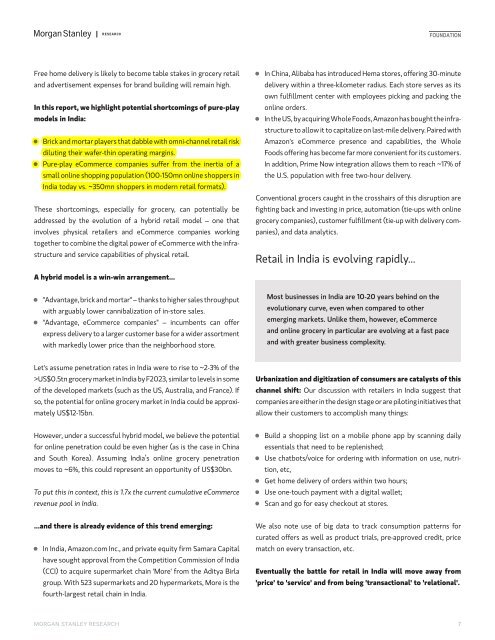Create successful ePaper yourself
Turn your PDF publications into a flip-book with our unique Google optimized e-Paper software.
M<br />
FOUNDATION<br />
Free home delivery is likely to become table stakes in grocery retail<br />
and advertisement expenses for brand building will remain high.<br />
In this report, we highlight potential shortcomings of pure-play<br />
models in India:<br />
l Brick and mortar players that dabble with omni-channel retail risk<br />
diluting their wafer-thin operating margins.<br />
l Pure-play eCommerce companies suffer from the inertia of a<br />
small online shopping population (100-150mn online shoppers in<br />
India today vs. ~350mn shoppers in modern retail formats).<br />
These shortcomings, especially for grocery, can potentially be<br />
addressed by the evolution of a hybrid retail model – one that<br />
involves physical retailers and eCommerce companies working<br />
together to combine the digital power of eCommerce with the infrastructure<br />
and service capabilities of physical retail.<br />
l In China, Alibaba has introduced Hema stores, offering 30-minute<br />
delivery within a three-kilometer radius. Each store serves as its<br />
own fulfillment center with employees picking and packing the<br />
online orders.<br />
l In the US, by acquiring Whole Foods, Amazon has bought the infrastructure<br />
to allow it to capitalize on last-mile delivery. Paired with<br />
Amazon's eCommerce presence and capabilities, the Whole<br />
Foods offering has become far more convenient for its customers.<br />
In addition, Prime Now integration allows them to reach ~17% of<br />
the U.S. population with free two-hour delivery.<br />
Conventional grocers caught in the crosshairs of this disruption are<br />
fighting back and investing in price, automation (tie-ups with online<br />
grocery companies), customer fulfillment (tie-up with delivery companies),<br />
and data analytics.<br />
Retail in India is evolving rapidly...<br />
A hybrid model is a win-win arrangement...<br />
l<br />
l<br />
"Advantage, brick and mortar" – thanks to higher sales throughput<br />
with arguably lower cannibalization of in-store sales.<br />
"Advantage, eCommerce companies" – incumbents can offer<br />
express delivery to a larger customer base for a wider assortment<br />
with markedly lower price than the neighborhood store.<br />
Most businesses in India are 10-20 years behind on the<br />
evolutionary curve, even when compared to other<br />
emerging markets. Unlike them, however, eCommerce<br />
and online grocery in particular are evolving at a fast pace<br />
and with greater business complexity.<br />
Let's assume penetration rates in India were to rise to ~2-3% of the<br />
>US$0.5tn grocery market in India by F2023, similar to levels in some<br />
of the developed markets (such as the US, Australia, and France). If<br />
so, the potential for online grocery market in India could be approximately<br />
US$12-15bn.<br />
Urbanization and digitization of consumers are catalysts of this<br />
channel shift: Our discussion with retailers in India suggest that<br />
companies are either in the design stage or are piloting initiatives that<br />
allow their customers to accomplish many things:<br />
However, under a successful hybrid model, we believe the potential<br />
for online penetration could be even higher (as is the case in China<br />
and South Korea). Assuming India’s online grocery penetration<br />
moves to ~6%, this could represent an opportunity of US$30bn.<br />
To put this in context, this is 1.7x the current cumulative eCommerce<br />
revenue pool in India.<br />
l<br />
l<br />
l<br />
l<br />
l<br />
Build a shopping list on a mobile phone app by scanning daily<br />
essentials that need to be replenished;<br />
Use chatbots/voice for ordering with information on use, nutrition,<br />
etc,<br />
Get home delivery of orders within two hours;<br />
Use one-touch payment with a digital wallet;<br />
Scan and go for easy checkout at stores.<br />
...and there is already evidence of this trend emerging:<br />
l In India, Amazon.com Inc., and private equity firm Samara Capital<br />
have sought approval from the Competition Commission of India<br />
(CCI) to acquire supermarket chain 'More' from the Aditya Birla<br />
group. With 523 supermarkets and 20 hypermarkets, More is the<br />
fourth-largest retail chain in India.<br />
We also note use of big data to track consumption patterns for<br />
curated offers as well as product trials, pre-approved credit, price<br />
match on every transaction, etc.<br />
Eventually the battle for retail in India will move away from<br />
'price' to 'service' and from being 'transactional' to 'relational'.<br />
MORGAN STANLEY RESEARCH 7
















